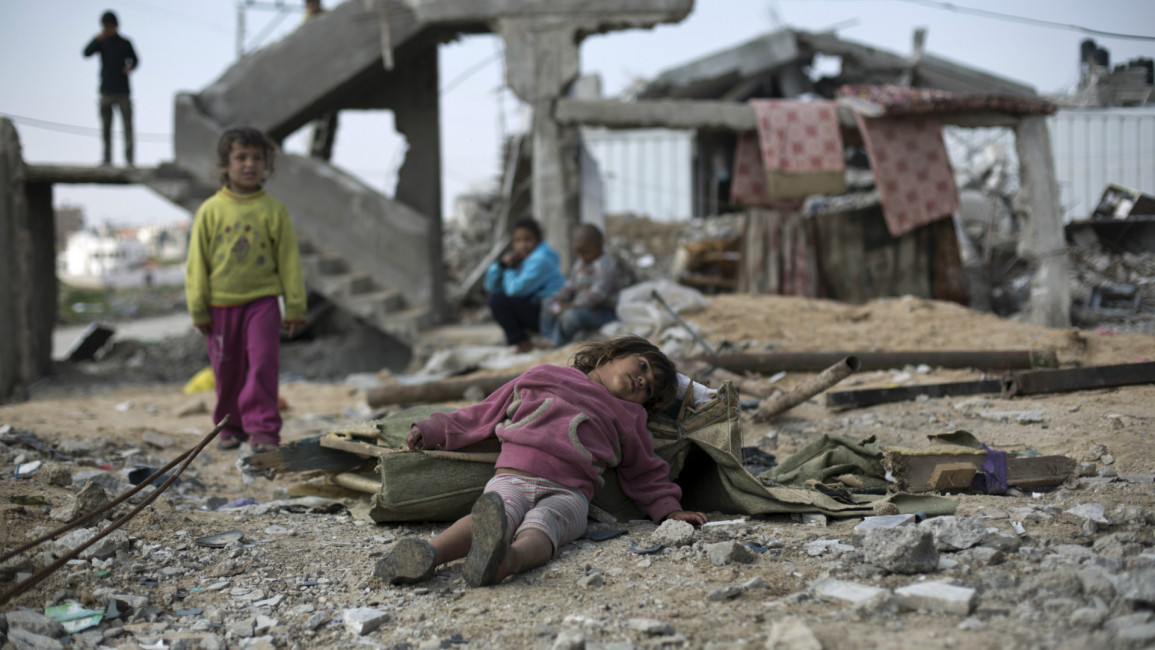UN rights council session on Gaza war begins
UN Human Rights Council started a special session Monday on the situation in the Palestinian territories and the 2014 Gaza conflict, following an inquiry into alleged war crimes committed by Israel.
A report by a special UN investigator said that Israel "deliberately" targeted civilian homes during last summer's attack on Gaza.
| During Israel's Gaza onslaught, an average of ten children died every day over a period of 50 days. |
The report will be presented Monday to the United Nations Human Rights Council (UNHCR) in Geneva by special rapporteur Makarim Wibisono of Indonesia, and will form part of the basis for the debate on alleged Israeli violations of human rights.
In his first report to the UNHRC, Wibisono wrote that "most victims were families killed in missile strikes in their own homes, usually at night.
The UN's casualty count, Wibisono said, listed 2,256 Palestinian fatalities, of which 1,563 were civilians, including 538 children. During Israel's Gaza onslaught, he said, "ten children died every day over a period of 50 days".
This casualty count is more than the two previous offensives against Gaza, he wrote, adding that it is disproportionately higher than the 66 Israeli soldiers and five civilians who died during the war.
The session had originally been scheduled to discuss a probe on the 50-day war in Gaza last year, but the investigators obtained a delay after the head of the team quit under Israeli pressure.
Canadian international law expert William Schabas resigned as chair of the Commission of Inquiry on the 2014 Gaza conflict last month after Israel complained he could not be impartial because he had prepared a legal opinion for the Palestine Liberation Organisation in October 2012.
Schabas strongly denied that he was beholden to the PLO but said he was reluctantly stepping down to avoid the inquiry into the July-August conflict - commissioned by the UN Human Rights Council - being compromised in any away.
The Gaza conflict ended with a truce between Israel and the territory's Islamist de facto rulers Hamas on August 26 after the deaths of more than 2,140 Palestinians, most of them civilians, and 73 people on the Israeli side, mostly soldiers.
The rights council vowed in August that both Israel and Hamas would be "subjected to a thorough investigation."
Israel boycott
However, Israel's representative was conspicuously missing from Monday's session.
Israel provided no immediate explanation for not being present at the session dedicated overwhelmingly to discussion of its policies and alleged abuses, but a source close to the council said its absence clearly amounted to a boycott.
Israel was not satisfied, calling for the entire inquiry to be shelved, insisting the commission and the Human Rights Council which created it are inherently biased against it.
Israel is the only country in the world with a special agenda item dedicated to it, meaning its rights record is discussed at every session of the UN's top rights body.
Its absence Monday does not mark the first time it has boycotted the council.
It cut all ties with the council in March 2012 over plans to probe how Jewish settlements were harming Palestinian rights, and did not resume relations until late 2013.
Monday's session came after Prime Minister Binyamin Netanyahu's right-wing Likud party won general elections last week.
Although the report on the 2014 Gaza war investigation was delayed until June, the UN's new Special Rapporteur on the situation in the Palestinian territories did not hold back.
"The ferocity of destruction and high proportion of civilian lives lost in Gaza cast serious doubts over Israel's adherence to international humanitarian law principles of proportionality, distinction and precautions in attack," Makarim Wibisono told the council.
He lamented "acute" needs in Gaza, warning that Israel's continued "blockade keeps Gaza in a strangle hold which does not even allow people to help themselves."
The United States was also absent from Monday's discussions.
"The US delegation will not be speaking about Palestine today," a US spokesman in Geneva told Reuters in response to a query as the debate began.
The last time that Washington spoke under that stand-alone agenda item was in March 2013, UN records show.



